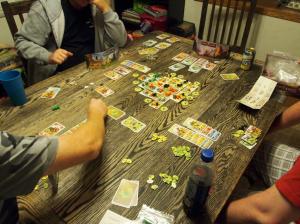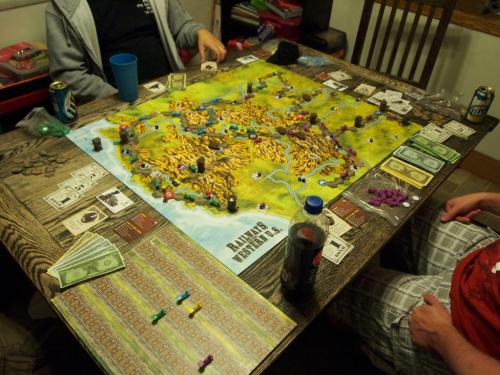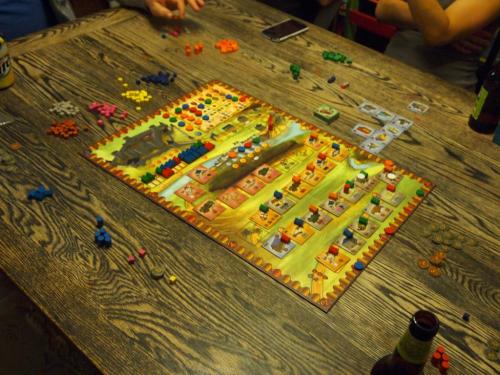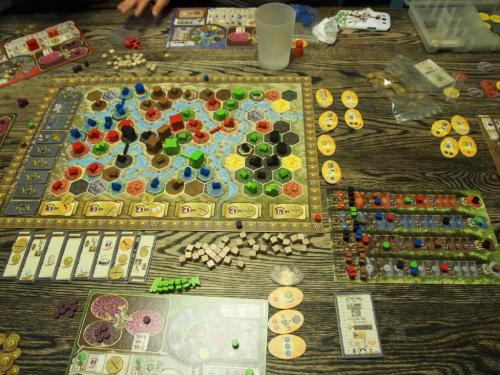I hope everyone had a great Labor Day!
We spent all day Saturday painting our house with the help of our friends and family. It was a lot of fun, and things got done very quickly.
Following all that Gina called it a night early, while Joe, Kevin, Phil and I played games. We started out with Railways of the Western US. The game started with three service bounties and two hotels available, but even with only four people I did not take any of them. Hotel Denver wasn’t available by my turn, and the only Service Bounty was for Bismarck, which didn’t have an easy delivery. I ended up taking Government Land Grants and using them to build my tracks. I took control of the North Western area, but really wasn’t able to maximize the deliveries until too late in the game.
Kevin spent a bunch of bonds, but started off quickly with service bounties and major lines in the lower right portion of the board, but the debt was too much. Phil was working around Denver early, but then took on the task of connecting San Francisco to Omaha. Joe Had control of the West coast, and though he started slower, he was able to get the train upgrades needed to really ship a lot up and down the coast.
I managed to finish the game with only four debt, but I hadn’t been making many points so I still ended up in last place. Kevin was close to Joe, but the his debt did him in. Joe’s deliveries had carried him to the win.
 We then broke out Ginkopolis for a quick break. I managed to win with 60 points by focusing on the construction. I had bonuses that propelled things and I was able to take control of two larger areas, much to Kevin’s chagrin. He was urbanizing a bunch and had a solid grip on a huge red area until Phil split it.
We then broke out Ginkopolis for a quick break. I managed to win with 60 points by focusing on the construction. I had bonuses that propelled things and I was able to take control of two larger areas, much to Kevin’s chagrin. He was urbanizing a bunch and had a solid grip on a huge red area until Phil split it.
We finished the evening with Dominant Species. I was playing as the reptiles, Kevin had the birds, Joe the arachnids and Phil was the insects. I was pushing for dominance through heavy adaptation, but about halfway through the game, Joe ended up with the same adaptations as I had, negating my dominance. Phil managed to take control of the tundra early, and scored a bunch of points before the rest of us realized what was happening. Kevin moved in to kick Phil out, but it was too little too late. Phil had spread all over by that point and was scoring a bunch of point in dominance as well.
I did manage to score 45 points from dominance with nine tiles at the end, but it wasn’t enough to catch Phil. Kevin and I tied, and Joe brought up the rear.
After a busy Saturday, Sunday was definitely a day of rest. We did get together with Phil and Kevin, though and started the night with Caylus. I wanted to focus heavily on building, but Phil ended up doing the same thing. This resulted in a ton of building built early. The Lawyer wasn’t built until after the gold space, so there wasn’t any civilian builds for most of the game.
Once I realized that the building strategy wasn’t going to work very well, I started just gathering as many resources as possible to assist in the building of the castle. Kevin and Gina had supplied a little, but no one was heavily focused. I was able to out supply Kevin on most turns and earned enough favor to help continue my supplies. Kevin did manage to build a prestige building for 16 points, but I had supplied enough to hold the lead.
The game was accelerating quickly, since there were so many building past the Bailiff, the Provost was constantly out in front. Without that speed, I don’t think I would have been able to sustain the lead, and Kevin would likely have been able to catch up with buildings. The game did end quickly, and I held the lead by a few points.
 We finished the night with Terra Mystica. I was playing the Witches, Phil the Darklings, Joe the Giants, Gina the Morbanks, and Kevin the Halflings. Everyone started off crammed into the middle and a lot of us went for strongholds early for the first turn bonus. I was also able to pop out a couple dwellings and a bridge, costing me a large chunk of my power. After turn two, though, I wasn’t feeling good about the game, as Joe and Kevin had kind of blocked me in in the center, and Phil was getting in the way in the lower right. I didn’t think I was going to get much going at that point.
We finished the night with Terra Mystica. I was playing the Witches, Phil the Darklings, Joe the Giants, Gina the Morbanks, and Kevin the Halflings. Everyone started off crammed into the middle and a lot of us went for strongholds early for the first turn bonus. I was also able to pop out a couple dwellings and a bridge, costing me a large chunk of my power. After turn two, though, I wasn’t feeling good about the game, as Joe and Kevin had kind of blocked me in in the center, and Phil was getting in the way in the lower right. I didn’t think I was going to get much going at that point.
I stayed the course, though. I built a Sanctuary on round three to get my first town and took the favor lowering the requirement for towns from 7 to 6. I was then able to easily build a town in the lower right on the following turn. That really changed everything. I had the income and had enough time left to build a third town in the upper right. I was also able to fully develop my shipping to connect my empire and tied Joe for first.
At the end, I held one of the cult, and was in second in two others. Kevin had similar position and we were neck and neck all game. The points for my empire were the difference maker, and I ended up beating Kevin by three points.
Until next time, happy gaming!












